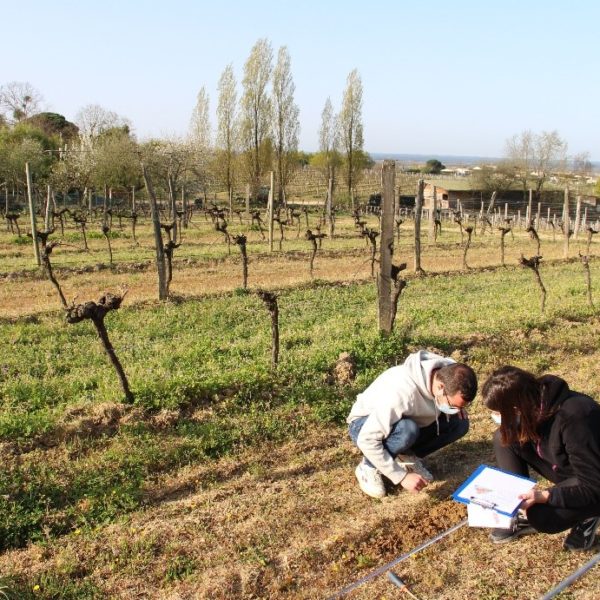The international students who have come to study at BSA (Bordeaux Sciences Agro) are all highly satisfied with the quality of the teaching and their integration in Bordeaux. They loved life in France, but they recommend being able to speak a little French before arriving. Find out what several former BSA master’s and bachelor’s students have to say.
“It’s good to learn in the vineyards”
“I wanted to study the French way of making wine”
“In the Bachelor’s program, there are three main subjects, which take up 90% of the time: viticulture, oenology and sensory analysis. There are no ‘stray’ subjects”
“What I liked was having teachers of different nationalities, who were all experts in their field.”
“Bordeaux is internationally recognized as one of the best places to study wine.”
“I also wanted to understand the economic side to the world of wine.”
“It’s good to learn in the vineyards”
Scott James Hurrell, 36, New Zealand, bachelor’s degree 2018-2019
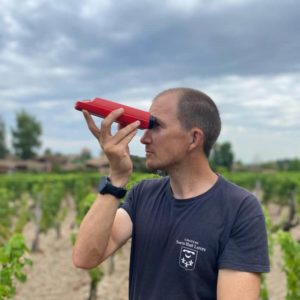
“Before joining BSA, I had already worked in vineyards and wineries in the Bordeaux region and in Sancerre, France for three years. I was also a manager in wine tourism in Bordeaux for 4 years, which allowed me to discover the Bordeaux châteaux. I already had a bachelor’s degree in business management and psychology from Christchurch, New Zealand.
I chose to study at BSA because I wanted to expand my knowledge of vineyards and wine. I needed a sound education. The bachelor’s program touched on all subjects. It was intense because the training program lasts just one year. BSA is a great school, with very good teachers. I had heard a lot of good things about the school.
What I liked about the bachelor’s program was the diversity of the instructors, who were all specialists in a particular subject: fermentation, barrel aging, vineyards, pruning, etc. My favourite courses were the wine tastings, which were very well supervised, the biodynamic classes, and the presentations given by professionals. The training is very specialized and includes a lot of practical work in the vineyards and laboratory experiments. I was not looking for just a theoretical training. It’s good to learn in the vineyards.
The class es are small, which means you can have a closer relationship with the teachers.
I really liked living in France. I lived there for 10 years. Bordeaux and the region are very interesting. I enjoyed walking through the small streets of the city of Bordeaux, going to restaurants, etc.
The administrative procedures (visa application, etc.) were difficult and long. You’ll need help with them.
I settled in well at the school. We all came from different places. We had common interests. We got along well. I found it easy to adapt to the French mentality as I was already living in France, so I understood how everything worked.
After completing my bachelor’s degree, I worked for two years at Château Smith Haut-Lafitte in Pessac-Léognan, where I had done my internship. I produced 2 wines there, participating in their maturing and the elaboration processes. I also worked in the vineyards in the spring and summer: I monitored diseases, yield estimates, etc. It went very well. Then, in New Zealand, I was assistant cellar master on a small estate.
“I wanted to study the French way of producing wine”
José Jesús Mata Zagoya, 23, Mexican, bachelor’s degree 2019-2020
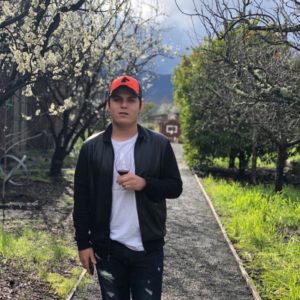
I come from Mexico. Before joining BSA, I had a degree in viticulture and oenology from Napa Valley College in California, USA. I chose to study at BSA because I wanted to study the French approach to wine production.
I really liked the different visits to châteaux, going out in the field, as well as the 2 weeks of internship at the beginning of the course. The strong points of the course are, in my opinion, the teachers, who are really interesting. My favourite classes were the oenology classes.
I loved living in France, especially in Bordeaux. It was a really good experience. Everything was very easy, including the administrative procedures. Integration into the school went very well
Today, I am in charge of the viticulture and oenology part of my family’s winery, called Cavall 7 in Delicias, Chihuahua, Mexico.
“In the bachelor’s program, there are three main subjects: viticulture, oenology and sensory analysis”
Hélias Bentejac, 23, French, bachelor’s degree 2019-2020 and Master 1 2020-2021
After my baccalaureate, I did a BTS vocational diploma in viticulture and oenology in the Bordeaux region. Then I travelled for two and a half years, to China, New Zealand, Australia, and the United States, in California, to learn the trade.
When I came back, I looked for training programs. My academic record was pretty poor, and I didn’t make it into an engineering school.
Since I was bilingual and wanted to continue my studies in viticulture, I joined BSA’s bachelor’s program in 2019-2020. They appreciated my motivation, my background, and my ambitions. There are not many bachelor’s degrees specializing in viticulture in France. There are only three in the country.
I then chose to continue at BSA on a master’s program because I wanted to remain in the world of wine. I didn’t want to take a master’s degree in French. In addition, I wanted to study the economics, business, and management of the world of wine.
What I really liked was the sensory analysis of the wine, the discovery of the wine on its tasting and smelling aspects, which is not something they do much in other schools.
I appreciated the openness to wines outside the Bordeaux region. On a scientific level, the physiology of the vine is taught in depth, since all the teachers are also researchers.
In the bachelor’s program, there are three main subjects that take up 90% of the time: viticulture, oenology and sensory analysis. There is no “stray” subjects.
In the bachelor’s program, I was the only French student and I was delighted. We visited wineries together. On the master’s program, six of us were French. At the beginning of the year, I helped the other French students with the English translation of technical terms.
On the other hand, with BSA engineering students, integration is more difficult when you don’t live on campus.
When I get my Master 2, I would like to manage production in a vineyard, as a cellar manager. Then, I would like to create or take over a vineyard in California in the United States, with my friend who is American.
“I enjoyed having teachers of different nationalities who were experts in their field”
Bruno de Faria Baricelli, 27, Brazilian, Master’s degree (exchange student within the BRAFAGRI program)
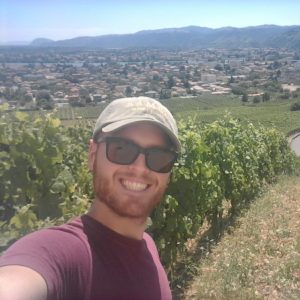 I came to BSA as an exchange student while studying agricultural engineering at the University of Sao Paulo, Brazil.
I came to BSA as an exchange student while studying agricultural engineering at the University of Sao Paulo, Brazil.
I discovered viticulture in my school in Brazil and fell in love with it. So, I looked for opportunities to develop my knowledge and I found this exchange program with BSA. In addition, I met Professor Guilherme Martinswho introduced me to the Master’s of Vineyard and Winery management. I chose this master’s degree for the opportunity to join an international group and for the quality of the teachers.
I liked the fact that I had teachers of different nationalities, who were all experts in their field. I think that’s the strength of the program, as well as being in a group with students from different countries, with different experiences and ways of seeing the world of wine. My favourite classes were the technical classes because I am an agricultural engineer. I really liked the audits too. That’s what connects the classes to “real life”.
I really liked living in France, and especially in Bordeaux. It’s a very beautiful city, with endless possibilities in all areas (culture, sports, gastronomy, etc.).
The administrative formalities are perhaps the negative point of life in France for a foreigner. Procedures are slow and require many documents. On the other hand, when it comes to your studies, it is simpler, with a specific procedure that is very clear in terms of conditions and requirements.
I settled in very quickly with the other students. Being in a small group of foreign students helped me settle in faster because we didn’t know many people when we arrived. Moreover, speaking French also allowed me to meet other BSA students. There are different societies, as well as sports teams at BSA that facilitate integration into student life.
I had an apartment on campus at BSA. It was really good. Living on campus is practical and less expensive than in the Bordeaux area.
From the moment I was approved for the exchange program, the BSA team supported me. They provided me with all the necessary documents to obtain a visa. They also helped me on a personal level when I arrived in France.
As part of my exchange, I had 2 months of French classes at the Alliance Française before the beginning of the master’s classes. They provided activities to help us settle in and discover Bordeaux.
The master’s degree at BSA introduced me to the world of wine. Since then, I went on to produce wine for a season in Chile, and then to California the same year, in 2016. I then came back to France because I really liked living in France and its wine culture. I am currently a consultant oenologist at Laboratoire Natoli et Associés. I work as a viticulture and oenology consultant across different wine regions: the Languedoc, the Rhone Valley, in Corsica, and in Spain.
“Bordeaux is internationally recognized as one of the best places to study wine”
Lilia Melissa Perez Jimenez, Mexican-American, 33, master’s degree (2015-2017)
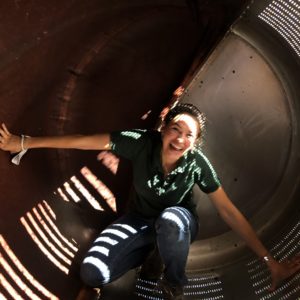 I was born in Sacramento, California, USA. At the age of 2, I moved to Mexico City, Mexico. My parents are Mexican.
I was born in Sacramento, California, USA. At the age of 2, I moved to Mexico City, Mexico. My parents are Mexican.
I have a bachelor’s degree in hotel management. I started by working in hotel restaurants. Wine is my passion. I then joined the Mexican Wine Council, as coordinator and communication manager for the international promotion of Mexican wines.
I chose the BSA Master’s programme in Bordeaux because I had already had the opportunity to visit the Gironde capital during Vinexpo, when I worked for the Mexican Wine Council. I met several people from the wine world there. So when I was looking for a master’s degree, I decided to do it in Bordeaux because I like the city, and the region is internationally recognised as a good place to study wine.
My favourite part of studying at BSA was the viticulture and oenology classes.
I loved living France, especially in Bordeaux. It was difficult at first, especially when it came to finding an apartment and obtaining a visa, as I didn’t speak French. But once you can speak the language, you can be more involved in the culture of the country. We lived in the Chartrons district, a historic area of Bordeaux where the great wine merchant families lived. My husband and I lived in a nice apartment. Everything was perfect! There was no need for a car: I went everywhere by bike or tram.
There were 16 students on the master’s program. It was really good being in a small group. We are still in touch with each other, on Whatsapp.
After the master’s degree, I had the opportunity to become a winemaker on Long Island in New York.
“I also wanted to understand the economic side to the world of wine”
Tommaso Nicolato, 29, Italian, master’s degree 2014-2016
I come from Vicenza, in the North-East of Italy. I am from the largest wine region in Italy, which produces prosecco. After high school, I studied oenology and viticulture for 4 years at the University of Padua in Italy. At the same time, I took evening classes and obtained my sommelier diploma. I had the opportunity to do my final year internship in New Zealand at the University of Auckland laboratory.
It was a personal choice to study wine because my family is not in the wine business, although my grandfather was a winemaker before the war. I am very attached to the Italian way of life, especially good food and good wine. I think it’s important to protect local industries.
I particularly like the red wines of Bordeaux. So, when I decided to finish my studies abroad, I chose to come to the capital of Gironde.
As I didn’t speak French, I looked for an international training program and I found the BSA program very interesting, especially the dual expertise: technical and business (economics, finance, marketing). I also wanted to understand the economic side to the world of wine.
The teachers listened to us to understand our expectations. They were all very good. Many international consultants give classes. The quality of teaching is remarkable.
When it comes to settling in France, it is best to be able to speak French before arriving, otherwise you will not understand anything that happens outside the school. I took French classes when I arrived.
I lived on campus in a studio apartment. The other French students in my class helped me to meet other students, to go out, etc. The BSA alumni society helped me to meet other people from the world of wine.
The downside is the French bureaucracy, like in Italy. You need a lot of administrative documents.
I love France and Bordeaux in particular. In fact, I stayed there after my master’s. I did my internships in a wine consulting company and at Château Palmer. I was recruited by the latter and stayed there for three and a half years, as head of the experimentation and development laboratory. It was a great experience. I learned a lot there. For the last 2 years, I have been working at the Excel laboratory in Bordeaux, as manager of the oenology sector. I also work from time to time as an external consultant at BSA.
See the Bachelor’s Degree in Viticulture and Enology program here
See the Master of Science in Vineyard & Winery Management degree program here
For more information
Professional opportunities following the Bachelor’s and Master’s degree programs
